Hevrin Xelef was the Secretary General of the Syrian Future Party, which is guided by a grassroots democratic initiative principle, and a beacon of hope for a diverse, democratic Syria. Five years ago, on 12 October 2019, the then 34-year-old was murdered together with her driver near Qamishlo in the course of Turkey's war of aggression against the autonomous region of North and East Syria.
Members of the so-called ‘123 Battalion’ of the jihadist militia ‘Ahrar al-Sharqiya’, which is part of the SNA (Syrian National Arm’) proxy invasion force, dragged Hevrin Khalaf from her car and mutilated her body before executing her. According to the autopsy report, the politician's body showed numerous injuries, including many bullet wounds and fractures to her legs, face and skull. Her scalp was partially detached and her hair was pulled out.
Following her murder, Hevrîn Xelef's name was given to a square in the Guillotiere neighbourhood of Lyon, France, to the Garden of Healing in Berlin, to the bridge over the ‘Rio Rivi Freddi - Cold River’ in the municipality of Berceto in Parma, Italy, to the nursery of Qamishlo and the garden of Raqqa in North-East Syria. In 2019, she was awarded the ‘Margerita Troli Award’ given annually by the Municipality of Capoa in Italy and the ‘Young Activist’ award of the ‘Italian Coalition for the Rights and Freedom of Civilians’ (Coalizione Italiana per la Libertà e i Diritti - CILD). Hevrîn Xelef's name was also included in the ‘Feminist Hope Archive’ prepared by the Association for Women's Rights in Development (AWID) on 1 October 2020.
ANF spoke to a long-time companion of Hevrîn Xelef, Samira al-Aziz, who is now deputy co-chair of the Syrian Future Party. The two women met in 2011, shortly before the revolution in Rojava.
Hevrîn Xelef was born on 15 November 1984 in the village of Rêhanik near Dêrik and studied civil engineering in Aleppo. After the revolution of 19 July 2012, both women worked in the structures of the autonomous administration, Samira al-Aziz said: “Hevrîn initially worked for the energy committee and I for the education committee. Between 2015 and 2018, we therefore often met in joint committees. Hevrîn's influence and contribution in these structures was clearly visible. She made constructive suggestions and pushed developments forward.
As co-chair of the economic committee of the Cizîrê region, she initiated projects for the economic prosperity of the people. She was future-oriented and wanted to broaden women's horizons in particular. As Secretary General of the Future Party, founded in Raqqa in 2018, she became a political and diplomatic pioneer for justice and equality for all ethnic groups in Syria. She was a Kurdish politician who defended the Rojava revolution and motivated many women to work in politics.
She did not limit herself to the Kurdish population. She pursued projects to bring peoples together. That is why she sought dialogue with all population groups and was also in close contact with representatives of Arab tribes. She was aware of her responsibility and role and acted with appropriate care and foresight.
She interacted with young people and women in a very good and loving way. She was a young woman herself and was a master at making others feel valued. Her brutal assassination still hurts as much today as it did on the first day. She believed in a free and united life for the people of Syria and fought for it until the last moment. Now it is our task to continue her fight. Women must organise themselves to play a leading role in the unity of Syria.”
Ahrar al-Sharqiya massacred many civilians, including Kurdish politician Hawrîn Xelef. Abu Hatim Shakra, one of the commanders of the Ahrar al-Sharqiya group accused of committing war crimes by the UN, graduated from the Artuklu University in Mardin on 6 June 2023, where he enrolled under the name Ahmed İhsan Fayyad al-Hayes. The same name was also on the agenda with his voting in the elections held in Turkey on 14 May 2023.














